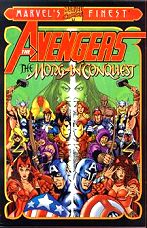 Written
by Kurt Busiek. Pencils by George Perez. Inks by Al Vey.
Written
by Kurt Busiek. Pencils by George Perez. Inks by Al Vey.
Colours: Tom Smith. Letters: Richard Starkings & Eric Eng Wong. Editor: Tom Brevoort.
Back to other trade paperback and GN reviews
The Avengers: The Morgan Conquest 2000 (SC TPB) 112 pages
 Written
by Kurt Busiek. Pencils by George Perez. Inks by Al Vey.
Written
by Kurt Busiek. Pencils by George Perez. Inks by Al Vey.
Colours: Tom Smith. Letters: Richard Starkings & Eric Eng Wong.
Editor: Tom Brevoort.
Reprinting The Avengers (3rd series) #1-4 (1998) - plus covers of 1, 2, 3 (including variants of 1, 2)
Rating: * * * (out of 5)
Number of readings: 2
When various ex-Avengers are attacked, the entire team
re-unites -- really. Just about everyone who had ever been an Avenger and
can still walk or crawl gathers together, totalling something like 40 super
heroes. Before they can accomplish much, though, their foe is revealed
to be Morgan Le Fay, from the King Arthur legends (being in the public
domain, Morgan's a popular gal in comics, with both Marvel and DC utilizing
the character from time to time). Morgan re-shapes reality into a medieval
state and brainwashes the Avengers into being her knights, all with spanking
new medieval-themed costumes. Eventually some of the Avengers shake-off
the brainwashing and try to set things right. The final story included
here has the Avengers, having defeated Morgan and restored reality, trying
to settle on a more manageable membership.
This kicked off the current Avengers series, and writer
Kurt Busiek plays the nostalgia card heavily as he reunites the disbanded
team. Unfortunately, since the Avengers only disbanded a little before
this, it doesn't generate a nostalgic lump in the throat one might get
if this was, I dunno, a revival of the Inferior Five or something. These
guys haven't been gone long enough for the fans to really miss them. Busiek
also threatens to fall into the trap of what I've come to dub the "Iconic
Age of comics". If the "Marvel Age" of the '60s and '70s was about writing
super heroes as people, with real problems and personalities, the "Iconic
Age" of the '90s is where fanboys-turned-writers emphasize the super over
the human. Iron Man tells us that he and Thor are friends...but
Busiek never shows us. Instead we get lots of dialogue about how
great the Avengers are, and how unflappable Captain America is...and how
dry scenes can be of 40 superheroes patting each other on the back and
saying how wonderful everyone is.
Eventually the adventure stuff kicks in, and the concept
is certainly grand, but again, hurt by Busiek's handling of characterization.
It would've been a great opportunity to explore why the different characters
react the way they do to the brainwashing. And there are some nice character
bits -- a scene between Captain America and Hawkeye, reminding us that
Hawkeye really likes being an Avenger, or some solo scenes of the Scarlet
Witch, or the reasons for Iron Man's reaction. But overall, the character
stuff is thin. With 40 odd characters, most really have nothing to do except
show how many people George Perez can draw in a single panel.
The plot to the 3 part Morgan story (called "Once an Avenger..."
inside the book) is likewise a bit undeveloped. For such a nifty idea --
all those Avengers, reality-warping, medieval times, etc. -- Busiek doesn't
really shape it into anything more than an O.K. time-waster. It's not that
it's wretched or anything. It's just a bit...pedestrian, lacking twists
and turns and intimate scenes.
It's the final story that catches fire.
The action-adventure stuff is minimal as the Avengers
attempt to prune their roster. But Busiek finally does character-stuff
right. Suddenly the "icons" revert to being people and there's a bigger
rush of nostalgia in just seeing these characters in character than
in all the chest beating and trumpet sounding of the earlier scenes. This
is the Avengers, and these 22 pages gives one more faith in Busiek's ability
to handle the team than the epic Morgan trilogy. It's a nice issue. Period.
A long ago Avengers artist, George Perez's art is jaw-dropping
to look at here, but maybe a little too much. He's always been a detailed
artist, but here it's maybe a little too busy occasionally, with intricate
panels where the minutia threatens to obscure the key elements. Still,
that's a minor quibble. And the problem may rest as much with colourist
Tom Smith's overly dark colours that kind of sap some of the energy.
The letterering employs varied fonts to portray the speaking
voices of various characters, but not always successfully. Iron Man's words
are etched out in mechanistic bubbles...but since Iron Man is a man in
a suit, surely it better captures the character to portray his words in
normal balloons, emphasizing the contrast of the mechanical suit with the
man inside. And, I'll admit, I'm just not a big fan of the computer-generated
lettering used by many modern letterers.
The Morgan Conquest is comprised of an O.K. but unexceptional
adventure...and a really quite appealing character-driven one-shot issue.
Cover price: $21.95 CDN./$14.95 USA.
Backpack Marvels: The Avengers: Nights of Wundagore 2000 (SC digest-sized TPB) 160 pgs
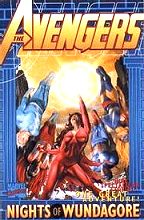 Written
by David Michelinie, Bill Mantlo, Steven Grant. Pencils by John Byrne.
Inks by Dan Green, Klaus Janson, Gene Day, Dave Hunt.
Written
by David Michelinie, Bill Mantlo, Steven Grant. Pencils by John Byrne.
Inks by Dan Green, Klaus Janson, Gene Day, Dave Hunt.
Letters: various. Editor: Roger Stern.
Reprinting: The Avengers (1st series) #181-189 (1979)
Black & White
Rating: * * * * (out of 5)
Number of readings: 1 (and then some)
The Avengers return to the European nation of Transia
to learn the deadly secret behind the origins of the Scarlet Witch and
Quicksilver -- as well as other adventures in this reprinting of 9 consecutive
issues in black and white.
Years ago the reprint medium of choice was digests --
half the dimensions of a regular comic, but with lots of pages. However
digests fell out of favour, eventually replaced by expensive Trade Paperbacks
which are at the opposite end of the economic spectrum from the cheap digests.
Marvel seems to be testing the water for a resurgence
in low-cost digests with their Backpack series which are (slightly) bigger
than the digests of old and similiar to Marvel's Essential books, in which
a bunch of issues are published in unbroken continuity in black & white
(Marvel's also produced a Spider-Man and at least one X-Men book in the
format)
The art by John Byrne, back in his glory days, takes to
the shrunken format quite well, everything clearly portrayed and comprehensible,
and printed sharply on white paper. This put me in a nostalgic mood --
I used to love digests (what kid on a budget wouldn't?) -- and it harkened
back to my misspent youth, and a time of the Avengers with which I was
already vaguely familiar, having issues from around that period.
Nights of Wundagore was a lot of fun. Perhaps not
on the same level as Jim Shooter's characterization-intensive run that
these issues follow, but these are nevertheless engaging in a kick-off-your-slippers-and-relax
way, with David Michelinie's capable scripting and Byrne's crisp, detailed
art. The membership roster alone keeps you on your toes, with characters
leaving and then rejoining within a few issues. Avengers who appear in
significant turns include Iron Man, Captain America, The Scarlet Witch,
the Vision, Quicksilver, the Beast, The Falcon, Ms. Marvel, Wonder Man,
The Wasp, and Hawkeye, with Jocasta having a few lines, and cameos by others.
The "Nights of Wundagore" storyline, clarifying the origins
of the Scarlet Witch and her brother Quicksilver and involving a confrontation
with an ancient evil, could have been covered by reprinting #181-182, 185-187
-- and was! I believe those issues were alrready collected in a full colour
TPB called The Avengers: The Yesterday Quest. But following
the trend of the Essential books, in this book we get an unbroken stream
of continuity (#181-189) that is appealing. As such, no single story is
expected to shoulder the burden of entertainment exclusively. The Wundagore
stuff is the highpoint, but isn't flawless. But when combined with a few
other "filler" tales, such as a two-part battle with the Absorbing Man,
it works nicely.
The Wundagore story may've been building for years (the
old man who arrives in New York in #181 was shown embarking for America
wa-ay back in #166), or it may've been a desperate attempt to explain continuity
errors. The story contains the Scarlet Witch and Quicksilver's recollections
of quite different origins (We were raised by Gypsies -- no, no, we're
the children of the superhero The Whizzer), which are woven together. It's
clever, gradually showing how the different fragments contain partial truths,
scenes acquiring new significance when viewed from a new perspective. There's
a nice sense of a narrative progression, too.
Admittedly, there're confusing references to other comics,
and not just in the mythos-intensive Wundagore issues. These stories were
published concurrently with Iron Man stories (collected in The
Power of Iron Man TPB) and partway through Iron Man disappears, then
reappears a few issues later, with only cryptic references as to what happened.
That's why I'm an advocate of annotations in collections to fill in gaps,
so confusing references can be cleared up for modern readers. In that vein,
this contains character profiles of the Scarlet Witch and Quicksilver at
the back of the book that answer a question left unanswered in the stories
themselves: namely who their biological father is. Because of that, a dangling
question that could be aggravating...isn't. O.K., I knew who their
father was, but it's a plus for those not aware of that little genealogical
tidbit.
Still, I'm curious as to the how the people who decide
what goes into these collections make their selections. You see, Nights
of Wundagore begins with the Avengers forced to operate under tighter
government regulation, with Marvel's resident smary bureaucrat, Henry Gyrich,
insisting they adhere to (supposed) equal-opportunity guidelines and recruit
the (black) Falcon. The final story ends with Gyrich vowing to shut down
the Avengers entirely.
Here's the thing. In the next two issues which aren't
included (#190-191) the whole Gyrich story resolves! What's more, the
Falcon (finally) proves his mettle, putting to rest any doubts he, and
others, had about his membership. In other words, had this collection included
just two more issues, not only would it have brought closure to one sub-plot,
but thematic closure to another.
As is, Nights of Wundagore, reprinting Avengers
#181-189, is an entertaining collection of mainly decent tales. But had
it reprinted #181-191 it would've made a true graphic novel -- with
a beginning, middle, and end. And isn't that what they should be aiming
for?
The whole equal opportunity thing is kind of awkward anyway.
The characters, including the Falcon, are insulted by the concept, but
once the Gyrich/government regulations thing was dumped from the series,
the Falcon (I believe) quickly followed. In other words, whether by accident
or design, Michelinie and company may've actually proved the value of such
policies, since, without 'em as a story ploy, the Avengers quickly became
an all white group. Food for thought, eh?
Anyway, it might be nice if Marvel did more Backpacks,
using it as a format for stories that maybe aren't "hot collectibles" but
might be attractive to readers in this more modest format. And DC Comics,
too -- you listening? O.K., DC has conspicuously refused to emulate the
success of Marvel's Essential books, so I don't think providing entertainment
for people on a budget is high on their priorities...but we can dream.
Ultimately, this is nothing classic, but crisp writing
and art combine -- particularly with the cheap price tag -- to make for
compulsively enjoyable reading.
Cover price: $9.95 CDN./$6.95 USA.
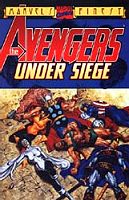 Avengers
Under Siege 1999 (SC TPB) 160 pgs.
Avengers
Under Siege 1999 (SC TPB) 160 pgs.
Written by Roger Stern. Pencils by John Buscema. Inks
by Tom Palmer.
Colours: Christie Scheele, others. Letters: Jim Novak. Editor: Mark
Gruenwald.
Reprinting: The Avengers (1st series) #270, 271, 273-277 (1986-1987)
Rating: * * * (out of 5)
Number of readings: 2
Taking advantage of some minor divisions in the Avengers,
Baron Zemo and a new Masters of Evil (comprised of a host of second string Avengers'
foes) manage to route the team and wrest control of, and occupy, Avengers' mansion itself,
before our heroes rally and fight back.
This was a pleasantly enjoyable saga -- though pleasant
might seem like an odd description for a story in which poor old Jarvis
gets beaten half-to-death. But there's a laidback mood to the thing that
makes it all palatable. On the other hand, that may be part of the problem.
Avengers Under Siege is enjoyable, without being riveting; interesting
without quite being edge-of-the-seat exciting. It's a decent read, but
not really a must read.
For one thing, the Avengers usually tackle big menaces
threatening the whole city or even the world. Here, though Zemo and his
gang mutter vaguely about what they'll do once they've defeated the Avengers,
they seem unfocused. The threat remains largely a personal one to the Avengers
themselves. Which may have been why this story has been collected some
12 years later. It's seen as a "personal" story that puts the characters
through the proverbial wringer. But even though the Avengers get kicked
around, and the mansion gets trashed, it never really convinces you that
Zemo and his gang have achieved anything more than a lucky first round.
The Avengers' line-up at the time consisted of Captain
America, the Wasp, the Black Knight, Hercules, and Captain Marvel II (the
woman who could turn into energy), with the Sub-Mariner and Thor popping
up occasionally, and guest stars for an issue or two like Ant-Man (II), Dr. Druid, Paladin and,
in a cameo, the Shroud.They're a likeable enough bunch, but they're also
a bit...dull, missing some of the more vibrant characters I associate with
the group. That may be a problem with Stern's writing, which tends to be
a bit subdued -- some of these characters have been more interesting elsewhere. At the same time, I enjoyed the humanity of the heroes. I suppose that's where the Avengers can sometimes break from DC Comics Justice League -- the greater sense that these are people first.
The plot also promises more intrigue than it entirely delivers.
Zemo hints at exploiting some of the tension between the Avengers, using
it as a wedge to divide-and-conquer, except the actual plot delivers very
little of that. The character conflicts seem a bit half-hearted. And for
all his talk, Zemo's main plan is just to gather enough goons that he out-numbers
the Avengers two-to-one (no great strategy there).
The climax of the saga becomes a showdown between Zemo
and Captain America -- the problem is, Cap hadn't really been the focal
character previously. Therefore, the story doesn't really feel like it's
reached some inevitable emotional/thematic climax the way Roger Stern obviously
thinks it has. Maybe I need to read it again to pick up on the nuances,
but viscerally it doesn't quite play. Additional note: after a second reading, I realize it is more obvious: throughout, Zemo makes no bones about the fact that he's attacking the Avengers partly as a way to strike at Captain America.
The art by John Buscema (a one time Avengers artist who
had returned to the fold) and Tom Palmer is, well, what can I say? When
Buscema draws characters sitting around, or standing, they look
like real people sitting around or standing. The down side, though, may relate
to my feeling of an overall...sedateness. Looking at these mighty, larger-than-life
figures, stand around, hands on hips, looking like they really existed
is strikingly effective (think Alex Ross in pencils and inks), but Buscema
doesn't unleash his characters as much as I know he can. We don't really
see the angst. As well, there's a roughness to his and Palmer's work at
times that becomes all the more glaring in contrast with the more carefully
rendered panels (perhaps that's why he is credited with "breakdowns"...his pencil art was a bit rougher than usual).
All of this goes to making Avengers Under Siege an enjoyable,
but not altogether remarkable read. In a way, its strengths are its weaknesses,
and vice versa. The art is beautiful, but a little restrained, the characters
are personable if not entrancing, the pacing is pleasantly unhurried --
not frenetic and hysterical -- but also a little too laid-back.
One final weakness, though, is a problem stemming from
cross-over stories. The Sub-Mariner is in the first chapter, then runs
off to get involved in an Alpha Flight story (a story which spilled into
Avengers #272 -- hence why it's not reprinted in this collection, nor is
the final page from Avengers #271, which led into #272). He doesn't return
for the remainder of this story. As well, the overall Under Siege saga overlaps
with a Captain America comic and a Spider-Man comic (neither of which are included). None of this undermines
the coherence of these issues -- watching Cap or Spider-Man battle some
of the villains solo hardly enhances the drama. But it does mean that in
this collection, the entire saga isn't actually collected.
This is a review of the story as it was originally
serialized in Avengers comics.
Cover price: $24.95 CDN./$16.95 USA.
The Avengers: Vision and the Scarlet Witch 2007 (SC TPB) 128 pages
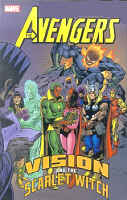 Written by Bill Mantlo, Steve Englehart. Pencils by Rick Leonardi, Don Heck. Inks by Ian Akin, Brian Garvey, John Tartag.
Written by Bill Mantlo, Steve Englehart. Pencils by Rick Leonardi, Don Heck. Inks by Ian Akin, Brian Garvey, John Tartag.
Colours/letters: various
Reprinting: Giant-Size Avengers #4 (the lead story), and the first Vision and the Scarlet Witch mini-series (1975, 1982)
Rating: * * * 1/2 (out of 5)
Number of readings: 2
Why companies like Marvel and DC choose certain material for collection at certain times can be -- I'll admit -- a mystery of almost cosmic ineffableness. So rather than dwelling on it, let's just proceed to the review.
This TPB focuses on one-time Avengers The Scarlet Witch and the android, the Vision -- long mainstays of that super hero team, whose starcrossed romance was stretched out over many issues, resulting in a wedding, various temporary estrangements and, then, because creative types had nothing better to do -- or, as would seem to be the case looking at so many similar events in comics, just were uncomfortable with the grown up idea of marriage -- they were eventually broken up, mucked up, messed up, and eventually, I believe, variously killed off. But these stories are from before all that.
Giant-Size Avengers #4 features the wedding of the Vision and the Scarlet Witch -- unfortunately, it is rather a problematic tale on various levels. For one, it serves as the climax to the whole Celestial Madonna epic (and was previously included in that earlier TPB), as such, there's a lot going on and a lot referenced that won't make a lot of sense out of context. As well, the art by Don Heck and John Tartag is -- well -- it just ain't very good. And further, the script by Steve Englehart, despite his good work on the Avengers, and on the Celestial Madonna epic in general, isn't his best, either, perhaps because he's trying to tie up too many threads.
So despite it being the climax of a "classic" saga, the real strength of this collection is the less significant mini-series.
This was the first of what would be two Vision & the Scarlet Witch mini-series featuring the married Avengers in solo adventures, after they've taken a leave of absence from the Avengers. Though "solo" is perhaps an overstatement, as there are plenty of guest appearances and cameos. That's because in addition to being a series featuring the Vision and the Scarlet Witch, it also covers much of their complicated back history, drawing in various characters who have a personal connection to the couple, and ultimately serving as a primer on the characters as well. Each of the four issues is relatively self-contained, even as one leads to the next.
The first issue is perhaps the most inconsequential (though involving some recapping of origins), involving the characters fighting an ancient sorcerer on Halloween. But the next three issues are emotionally richer, drawing upon the characters' elaborate histories, involving the Whizzer (the man the Scarlet Witch had once believed to be her father), Wonder Man and the Avengers, and Quicksilver (the Scarlet Witch's brother) and the Inhumans, and a climactic confrontation with arch-foe Magneto as the characters finally learn what Marvel had been hinting at for years -- Magneto is the true father of the Scarlet Witch and Quicksilver.
Mantlo's writing is a tad pretentious here, but generally nicely effective. Likewise, the art, though not especially dynamic, boasts a certain low-key atmosphere and mood. Which suits the series which manages -- despite plenty of action and fighting -- to be kind of subdued, even sombre. There's a thoughtful melancholiness at work in the tales, perhaps appropriate for star crossed characters whose history was full of so many sad coincidences and missed opportunities. Yet it is not needlessly grim or relentlessly mean as so many modern comics can be.
Indeed, part of the appeal of the series is simply that it exists. A mini-series of one of the most intriguing couples in comics who have been particularly ill-served by later creative "geniuses" at Marvel, it's moody, occasionally moving, and manages to seem like it's definitely trying to be more -- and more sophisticated -- than simply a churned out mini-series featuring second tier heroes.
The third issue is arguably the strongest, and the most atmospheric, involving the delirious Vision struggling with nightmares while unconscious, even as menaced by the Grim Reaper. But, overall, this is a reasonably effective, engaging effort.
This is a review of the story as they were originally published in comic book form.
Cover price: $__ CDN./$15.99 USA.
The Avengers: The Yesterday Quest 199_ (SC TPB) 80 pages
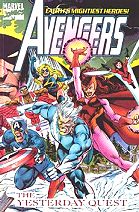 Written
by David Michelinie (story Mark Gruenwald, Steven Grant). Pencils by John
Byrne. Inks by Dan Green, Klaus Janson.
Written
by David Michelinie (story Mark Gruenwald, Steven Grant). Pencils by John
Byrne. Inks by Dan Green, Klaus Janson.
Colours/letters: various. Editor: Roger Stern
Reprinting: Avengers (1st series) #181, 182, 185-187 (1979)
Additional notes: #181 was not, apparently, reprinted in its entirety.
Rating: * * * * (out of 5)
Number of readings: 2
The Yesterday Quest collects a storyline wherein the mutant
Avengers, Quicksilver and the Scarlet Witch, investigate the ambiguities
-- and outright contradictions -- of their childhoods, by returning to
their native Transia with an old man who claims to be their real father.
The rest of the Avengers get involved, as well, particularly when the return
to Transia also involves an ancient evil intending to conquer the earth.
Comic book collections and TPBs have proliferated so much
over the years that many stories aren't just collected -- but are re-collected
in more than one book. Case in point is this story which, a few years after
this full colour TPB was released, also saw print as part of a black and
white digest-sized collection, The Nights of Wundagore
-- which is where I read it. Just for the hheck of it -- and to make my
review site as complete as possible -- I decided to re-read the story,
this time just focusing on the issues collected here.
In my review of The Nights of Wundagore, which
collected Avengers #181-189, I mentioned that The Yesterday Quest
storyline benefitted from being part of a run of issues. It wasn't required
to carry a book entirely on its own. But, the fact of the matter is, The
Yesterday Quest is an entertaining enough adventure just by itself.
According to my sources, issue #181 isn't reprinted in
its entirety, presumably because a lot of it related to an on-going sub-plot
about the Avengers' pruning their membership and getting government sanction,
stuff not really relevant to this adventure. What remains is an interesting,
reasonably off-beat tale, beginning with an adventure with the Avengers
in New York, then focusing on the mutant siblings for the middle part,
before the team re-unites for the climax.
Admittedly, this is one of those mythos heavy stories
that can be fun if you know your background, but a mite confusing if you
don't. I'm assuming the genesis of the story -- the contradictory "origin"
stories for Wanda and Pietro that are sorted out here -- wasn't some long
laid out master plan, but rather a simple result of different writers tossing
in different story ideas over the years, and it finally falling to these
guys to try and make it all make sense. Or maybe not. Maybe it was a grand
plan. In this story we still don't learn who Wanda and Pietro's real
father is, but there's little doubt the people at Marvel had already figured
that out (it would later be revealed that he was super villain Magneto).
But the origins of Wanda and Pietro, and the whole history of Wundagore
mountain, is a complex stew with lots of references and flashbacks to characters
like the High Evolutionary...though there weren't a lot of annotations
in the edition I read to indicate what is new information, and what flashbacks
to previously chronicled stories, nor in what comics those stories were
told. As such, the story can be a bit bewildering...but also fun, benefitting
from the very richness and complexity of the ideas. After all, it's not
like I knew too much about this stuff, or had even heard of Wundagore mountain,
before I read this storyline -- and I enjoyed it.
That's why I referred to this as an off-beat tale -- it's
more than just a slugfest with a super-villain (though there's that, too).
Byrne's crisp art is good, even if Green and Janson's
heavier ink style maybe doesn't entirely suit his then detailed, geometric
style.
Unlike DC Comics, which has re-invented its characters,
I have to remind myself that these old stories are, presumably, still considered
canon -- that readers of the current Avengers can still read this and all
it's revelations are relevant. Relevant but, admittedly, maybe a bit dated.
That's maybe the problem with collecting stories "significant" to a character's
mythos -- once enough time has passed, the significance becomes muted.
Still, The Yesterday Quest is a nice adventure. Here it's
collected in colour, but by itself, in The Nights of Wundagore,
it's collected with a bunch of other issues...but in black & white
and smaller size. Take your pick as to which you'd prefer.
This is a review of the story as it appeared in Avengers:
Nights of Wundagore
Cover price: __
Back to Avengers Reviews - Page
1